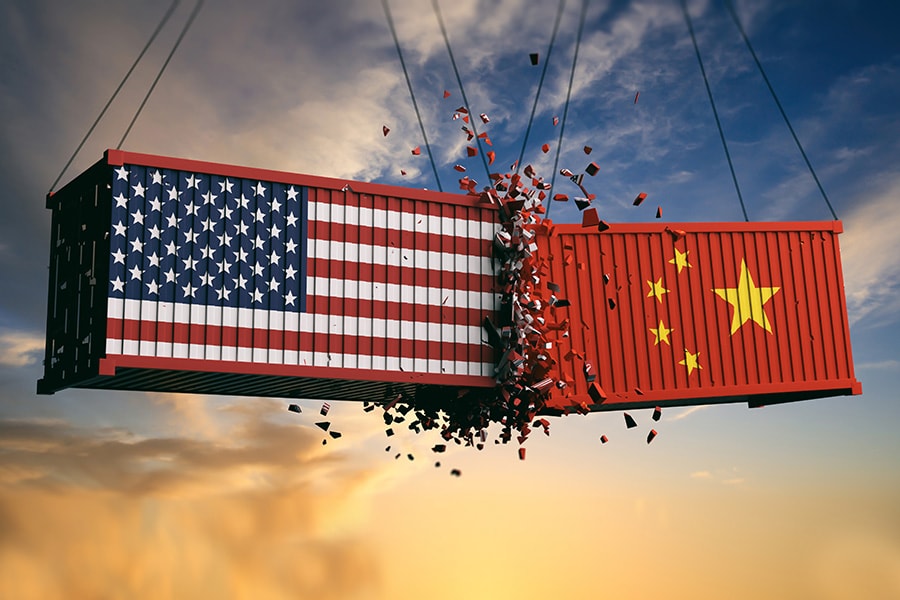The Impact of the U.S.-China Trade War on Global Markets
The U.S.-China trade war has been one of the most significant global economic events in recent years. What started as a series of tariffs imposed by the United States on Chinese imports has escalated into a complex geopolitical conflict that has disrupted global markets. This trade dispute has impacted not only the economies of the U.S. and China but also supply chains, international trade, and emerging markets worldwide. Understanding the scope of this trade war and its long-term consequences is essential for businesses and policymakers alike.
Understanding the U.S.-China Trade War
The trade conflict between the U.S. and China began in 2018 when the U.S. imposed tariffs on Chinese goods, citing unfair trade practices, intellectual property theft, and the massive trade deficit between the two nations. China retaliated with tariffs of its own, and the tit-for-tat exchange of trade barriers soon spiraled into a full-blown trade war.
The imposition of tariffs on billions of dollars’ worth of goods has led to increased prices for consumers and businesses, disrupted global supply chains, and created uncertainty in international markets. Although the U.S. and China signed a “Phase One” trade deal in early 2020, many tariffs remain in place, and tensions between the two superpowers continue to affect global markets.
How the U.S.-China Trade War Impacts Global Markets
1. Global Supply Chain Disruptions
One of the most immediate impacts of the U.S.-China trade war has been the disruption of global supply chains. Many businesses worldwide rely on Chinese manufacturing for their products, and the increased tariffs have forced companies to reconsider their supply chain strategies. Companies have had to find alternative suppliers, move production to other countries, or absorb the increased costs—all of which have contributed to delays and higher prices for consumers.
Secondary Keyword: Global supply chain disruptions from U.S.-China tensions
2. Impact on Key Industries
Several industries have been hit particularly hard by the trade war. Technology, agriculture, and manufacturing are among the most affected sectors. U.S. tech companies, for example, rely heavily on China for components and manufacturing, while Chinese firms are major buyers of U.S. agricultural products such as soybeans. The trade war has led to a decline in exports for U.S. farmers and disruptions in the tech supply chain, affecting both countries’ economies.
3. Currency Manipulation and Trade Imbalances
In addition to tariffs, the trade war has also sparked concerns about currency manipulation. China has been accused of devaluing its currency, the yuan, to make its exports more competitive. This currency manipulation creates further complications in the global economy, affecting the exchange rates and international trade relationships of countries beyond just the U.S. and China.
4. Global Market Volatility
The uncertainty created by the U.S.-China trade war has caused increased volatility in global markets. Stock markets in both countries have experienced fluctuations as investors react to new tariffs, trade deals, or retaliatory actions. The uncertainty surrounding the future of U.S.-China relations has led many businesses and investors to adopt a more cautious approach, resulting in slower global economic growth.
5. Developing Countries: Collateral Damage
While the U.S. and China are the central players in this trade war, the economic fallout has been felt worldwide, particularly in developing countries. Many emerging economies rely on trade with both the U.S. and China for growth. The reduction in global trade has slowed their economic development, disrupted export industries, and reduced foreign direct investment. Countries like Vietnam, Malaysia, and Bangladesh, while benefiting from some supply chain shifts, also face increased competition and uncertainty.

Long-Term Effects of the U.S.-China Trade War
The long-term consequences of the U.S.-China trade war are still unfolding. Some of the most likely outcomes include:
1. Decoupling of the U.S. and China Economies
As tensions continue, there is growing talk of “decoupling” the U.S. and Chinese economies. This would involve the U.S. reducing its reliance on Chinese manufacturing and technology and encouraging American companies to move production to other countries. While this might reduce dependency on China, it could lead to higher costs for U.S. companies and consumers and more fragmented global markets.
2. Diversification of Supply Chains
One of the key lessons businesses have learned from the trade war is the importance of diversifying supply chains. Companies that were overly reliant on China for manufacturing have been forced to seek alternative suppliers, often in countries such as Vietnam, Mexico, or India. This diversification strategy may help reduce risks in the future, but it will likely lead to increased costs in the short term as businesses adjust to new suppliers.
3. Shifting Global Trade Patterns
The trade war has already led to changes in global trade patterns, with countries such as Japan, South Korea, and the European Union seeking to strengthen trade relations with the U.S. or China to mitigate the impact of the conflict. Meanwhile, China has focused on deepening its trade ties with other countries through initiatives like the Belt and Road Initiative (BRI), seeking to reduce its dependency on the U.S. market.
Mitigating the Risks of Future Trade Conflicts
Given the potential for future trade conflicts between major economies, businesses must take steps to mitigate risks. Here are a few strategies that can help:
- Diversify Markets: Businesses should diversify their customer base by expanding into new regions and countries to reduce dependency on any single market.
- Invest in Technology: Technological innovations such as automation and digital supply chain management can help businesses improve efficiency and reduce costs, making them more resilient to trade disruptions.
- Monitor Geopolitical Trends: Staying informed about global political developments is essential for businesses operating in international markets. Monitoring trade negotiations, regulatory changes, and political tensions can help businesses anticipate risks and adjust their strategies accordingly.
- Build Strategic Partnerships: Forming partnerships with local companies in key markets can provide businesses with the support and expertise needed to navigate trade disruptions and regulatory changes.